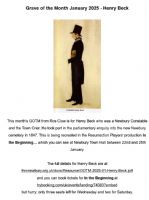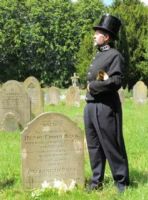AN OLD NEWBURY ‘OYEZ’ MAN
This reproduction of a painting presented to Newbury Records Office is of a man whose job died out with the increase of motor traffic, simply because his voice could no longer be heard in the streets.
It is of Henry Beck, in his official uniform of bellman, a post to which he was appointed in 1838. The bellman was, in fact, the town crier, though he did not hold that title, his full designation being bellman and beadle tithing man. His ‘perks’ of office included small fees charged people for tolling his bell and crying out items such as the loss of possessions - a dog or a purse. He also ‘cried’ official announcements, repeating them every 20 or 30 yards. He accompanied the Mayor on official engagements, always being present at the opening of the two-day St. Bartholomew Fair.
The tithing man’s duties were to report any infringements of the current town by-laws. A trader, for example, might be reported for having a sunblind or display extending on the public footway. Justice would be done by the imposition of a quit rent. Then a house-holder in Northbrook-street might need to be brought to book for an offence such as emptying house refuse or ashes into the roadway. People were permitted to empty their bowls and pans of dirty water into the brook that ran past their front doors and gave the street its name.
Newbury had several quaintly-styled officials in those days, all appointed by the Court Leet, consisting of the Court Baron and lords of the Manor of Newbury, which met on the same day as the Borough Sessions.
Records in the Borough Archivist’s Office show, for example, that in 1838, the second year of Queen Victoria’s reign, appointments included two constables; tithing men for Bartholomew-street, Northbrook-street and Cheap-street; two bailiffs for the Mayor (they probably acted as mace-bearers as well); a mug and pot sealer, whose job it was to check the drinking vessels used in public houses, bread and butter weighers, a fish and flesh taster, haywards for the common ground in the Marsh (now Victoria Park) and Northcroft; and surveyors of the streets.
The post of bellman was never officially extinguished - it gradually died out with the changing times, the growing noise from mechanical transport in the streets - and the rising importance of newspapers, together with their increasing use as advertising media. |


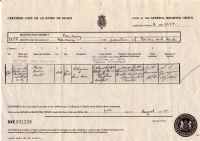
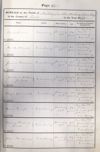
.jpg)
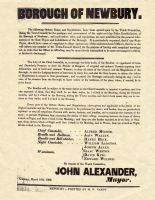
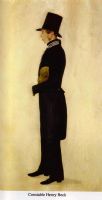
.jpg)
